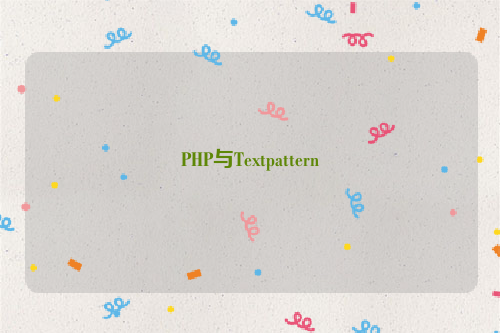PHP与Textpattern:一种强大的组合
在当今的Web开发领域,技术的发展日新月异,各种编程语言和框架层出不穷,对于许多开发者来说,选择合适的工具和技术来构建自己的网站和应用程序仍然是一个具有挑战性的问题,在这篇文章中,我们将探讨PHP、Java和C++这三种流行的编程语言,以及它们如何与Textpattern这个强大的内容管理系统(CMS)相结合,为开发者提供更多的灵活性和创造力。

让我们了解一下这三种编程语言的基本特点,PHP是一种广泛使用的服务器端脚本语言,它可以嵌入到HTML中,用于创建动态网页,Java(JAVE)是Java平台的一个扩展,用于处理XML数据,C++是一种通用的编程语言,支持多种编程范式,包括面向对象和过程式编程,Textpattern是一个基于PHP的内容管理系统,它允许用户轻松地创建和管理网站,Textpattern提供了一个简单易用的界面,让用户可以快速设计和定制他们的网站,Textpattern还具有丰富的插件系统,可以让用户根据自己的需求添加各种功能,如评论、社交分享等。
如何将这三种编程语言与Textpattern相结合呢?这并不难,我们需要了解PHP的基本语法和结构,虽然Textpattern是基于PHP开发的,但它也支持其他编程语言,我们可以使用PHP编写后端逻辑和与数据库交互的代码,我们还可以使用JAVE处理XML数据,例如从RSS源获取文章列表或者处理RSS输出的格式,我们可以使用C++进行性能优化或者编写一些特定的功能模块。
下面是一个简单的示例,展示了如何使用PHP、JAVE和C++与Textpattern一起工作,假设我们要从一个RSS源获取文章列表并将其显示在Textpattern的网站上,我们可以按照以下步骤进行操作:
- 使用PHP编写一个函数,使用JAVE解析RSS源并提取文章信息。
- 使用C++编写一个程序,调用上面的PHP函数并处理结果。
- 将C++程序编译为共享库(在Linux上生成.so文件,在Windows上生成.dll文件),然后在Textpattern网站上调用这个共享库,在Textpattern的主题文件中添加以下代码:
<?PHP
require_once 'jave/src/main/autoload.php';
use Jave\Feed\Reader as FeedReader;
function getArticleListFromRss($rssUrl) {
$feed = FeedReader::import($rssUrl);
$articles = array();
foreach ($feed as $entry) {
$articles[] = array(
'title' => $entry->getTitle(),
'link' => $entry->getLink(),
'description' => $entry->getDescription()->getValue(),
);
}
return $articles;
?></pre><pre class="brush:cpp;toolbar:false">
#include <iostream>
#include "getArticleListFromRss.h" // Assuming the PHP function is in a separate file called "getArticleListFromRss.h"
#include <vector>
#include <string>
#include <sstream>
#include <iterator>
#include <algorithm>
#include <regex>
std::vector<std::string> getArticleListFromRss(const std::string& rssUrl) {
std::vector<std::string> articles;
// Call the PHP function and store the result in "articles" vector
std::string phpCode = "<?php\n" + getArticleListFromRss("http://example.com/rss.xml"); // Replace with the actual PHP code to call the function and return the result
std::istringstream stream(phpCode);
std::string line;
while (std::getline(stream, line)) {
articles.push_back(line); // Assuming the PHP function returns a single line of text per article
}
return articles;
}</pre><pre class="brush:xml;toolbar:false">
<script type="text/javascript" src="path/to/your/sharedlibrary"></script> <!-- Replace with the actual path to your shared library -->
<script type="text/javascript">
// Load the shared library and call the getArticleListFromRss function when the page loads or on specific events (e.g., after an article is published)
</script></pre>





还没有评论,来说两句吧...